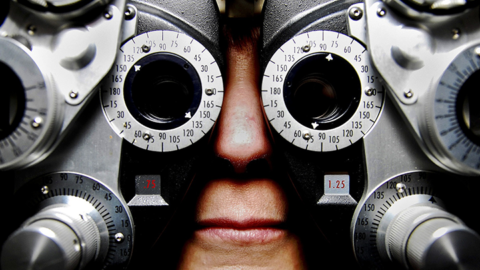The human brain is an extraordinary organ. Part of an elaborate neurological network, the brain helps us interact with the world around us. It is important...
Focusing on healthy vision as you age
The human eye and vision centres in the brain are quite complex. Detection of colour, depth, and central and peripheral visual fields are all important functions that help us perceive and interact with the world around us. However, just like the rest of the body, our vision steadily declines over time. One of the most common complaints that occur in adults between the ages of 40-60 years is trouble seeing objects nearby, such as difficulty with reading a book or working on a computer.
Other more complex issues can arise such as cataracts and age-related macular degeneration. Cataracts involve cloudy buildup within the lens of the eye. This can lead to opaque, blurry vision, faded appearance of colours, difficulty seeing at night and double vision. Proteins within the lens breakdown with age and clump together causing this cloudy discolouration[i]. According to the Canadian Association of Optometrist, an estimated 3.2 million Canadians have cataracts and most are over the age of 60[ii]. Age related-macular degeneration is a condition whereby the central part of the retina known as the macula, deteriorates slowly causing difficulty with focusing on objects such as during reading, driving, and observing fine details. Peripheral vision is not affected in age-related macular degeneration[iii].
Both of these conditions, as well as the normal and expected age-related decline in vision can be prevented or delayed by simple lifestyle changes:
- Smoking – individuals who smoke cigarettes are three to four times more likely to develop age-related macular degeneration. Smoking has been linked to eye diseases including cataracts and age-related macular degeneration. It has been linked to poor vision health in people over 50 years of age[iv]. So, choosing to quit smoking can benefit vision and eye health.
- Sun exposure – exposing the eyes to UV rays can increase the risk for cataracts. Staring directly into the sun or reflections of the sun on snow, water, sand and pavements can expose the human lens to harsh UV rays. Wearing sunglasses that offer 100% UV blocking protection and limiting time outdoors when the sun’s rays are the strongest, between 12pm -4pm, can help protect your peepers.
- Maintaining healthy blood pressure levels – high blood pressure is a risk factor for age-related macular degeneration since small blood vessels within the retina and surrounding regions can be damaged with high blood pressure. Keeping blood pressure levels in check not only reduce your risk of heart disease but also support healthy vision as you age.
- Antioxidants – Vitamin A, and E, beta-carotene, lutein, anthocyanidins, zeaxanthin and carotenoids have all shown to lower the risk of age-related macular degeneration and to help prevent cataracts. All these antioxidants can be obtained from a variety of fruits and vegetables, especially dark green leafy vegetables and bright orange, yellow and red fruits. Supplementing with these nutrients, whether it’s from food or natural health products can help reduce damage to the retina and support healthy vision for many years to come[v].
Making better lifestyle choices, eating a balanced diet, regularly having your eyes examined by your eye specialist and supplementing with antioxidant rich formulas can help prevent poor vision and common eye disorders.
[i] Nationals Eye Institute (Aug 2019). Caratacts. National Institute of Health. Retrieved on July 10, 2020. <https://www.nei.nih.gov/learn-about-eye-health/eye-conditions-and-diseases/cataracts>.
[ii] Canadian association of optometrists. UV damage you can’t see that impacts your vision. Retrieved on July 10, 2020. < https://opto.ca/health-library/uv-damage-you-cant-see-but-impacts-your-vision>.
[iii] Canadian association of optometrists. AMD (Age-related macular degeneration). Retrieved on July 10, 2020. <https://opto.ca/health-library/amd%20and%20low%20vision>.
[iv] R.K. (Feb 2020). American academy of opthalmology. Perfect vision? 20 tips to keep it that way. Retrieved July 14, 2020. < https://www.aao.org/eye-health/tips-prevention/tips-to-keep-perfect-vision-2020>.
[v] A.F., A.A., C.P., A.A. (Mar 2017). The antioxidants in the process of ocular pathology. Nutricion hospitalaria; 34(2):469-478.
Related Posts
Back to School
Bell LifestyleSeptember 14
Heading into a new school year can bring on a range of different emotions and this new school year is no exception. After a whirlwind of a year with...
As we mature, our skin changes, our hair changes, and yes, our vision changes as well. There are common phases in our lives when vision can change. In this...
Back to School
Bell LifestyleSeptember 14
Heading into a new school year can bring on a range of different emotions and this new school year is no exception. After a whirlwind of a year with...
As we mature, our skin changes, our hair changes, and yes, our vision changes as well. There are common phases in our lives when vision can change. In this...
Categories
- Allergy Relief
- Bell Lifestyle News
- Brain and Vision Health
- Depression
- Digestive Health
- Eating Healthy
- Energy Boosts
- Fitness
- Foods for Energy
- Heart and Lung Health
- Herbs
- Immune System Support
- Lifestyle
- Men's Health
- Mental
- Motivation
- Natural Remedies
- Nutrition
- Pain Relief
- Physical
- Recipes
- Relationships
- Sexual Health
- Skin and Hair Health
- Sleep Health
- Social
- Stress Relief
- Uncategorised
- Videos
- Weight Management
- Women's Health
- Your Wellness Now
Follow us on Twitter
#90 Bladder One for Women™ is a convenient one-a-day capsule for urinary tract health, featuring herbal extracts in… twitter.com/i/web/status/1…
May 2023Urinary tract infections - UTI: To treat or prevent? That is the question. Find out more about causes and treatme… twitter.com/i/web/status/1…
May 2023"How you feel is very important to how you look. Healthy equals beautiful." - Victoria Principal #womenshealth https://t.co/OPShoEbOXb
May 2023
© Copyright 2024. All rights reserved.





